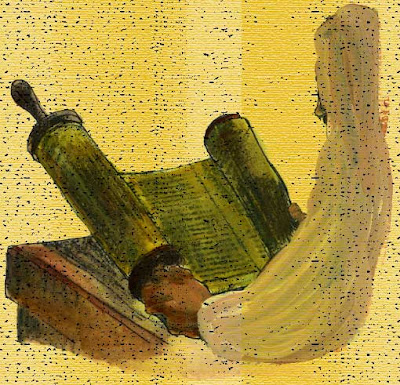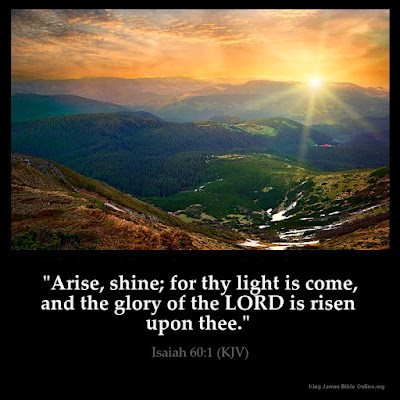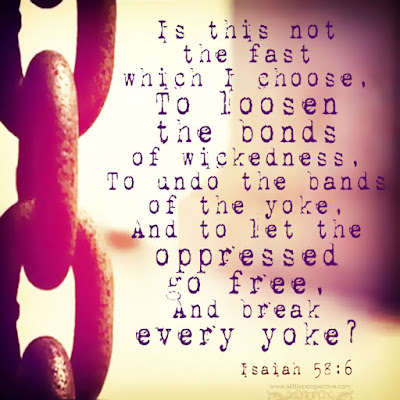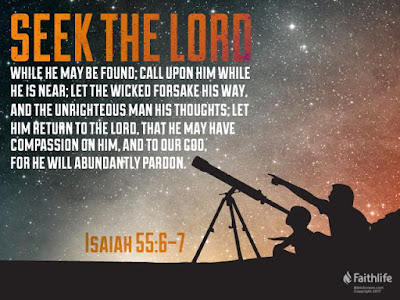Day Five: Read Isaiah 63-64
1. What is the answer to the question in 63:1? I thought it would be The Messiah, Jesus, but the commentary below asserts it is Jehovah specifically.
The solitary Figure who speaks in Isa_63:3-6 is not the servant of the Lord, or the Messiah, but Jehovah Himself (comp the parallel, Isa_59:16); the blood which reddens His garments is expressly said to be that of His enemies; and the “winepress” is no emblem of the spiritual sufferings endured by our Lord, but of the “fierceness and wrath of Almighty God’ (Rev_19:15) towards the adversaries of His Kingdom. While it is true that the judgment is the prelude to the redemption of Israel, the passage before us exhibits only the judicial aspect of the Divine dealings, and it is not permissible to soften the terrors of the picture by introducing soteriological conceptions which lie beyond its scope.
The image presented is one of the most impressive and awe-inspiring in the Old Testament, and it is difficult to say which is most to be admired, the dramatic vividness of the vision, or the reticence which conceals the actual work of slaughter and concentrates the attention on the Divine Hero as He emerges victorious from the conflict. (Prof. J. Skinner, D. D.) (Prof. J. Skinner, D. D.)
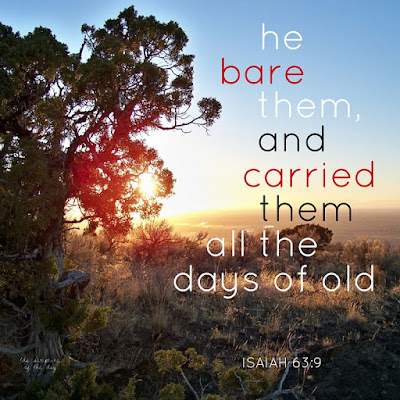
2. From verses 7-14, what and who should Israel remember?
"I will recount the steadfast love of the LORD." Isaiah 63:7
3. What remembrances do you have of the Lord's loving kindness? Many--often in the most difficult of times in particular. I'm not sure if this is because of my heightened need in such moments, or if it's the contrast of extreme emotions. He has also expressed love in everyday moments and small gestures that could only be understood in significance by me.
4. From chapter 64, what two earthly relationships used to describe the relationship between
God and His people do they need to recognize? He is our father. He is the potter. We are his clay.
Isa 64:8 But now, O LORD, you are our Father; we are the clay, and you are our potter; we are all the work of your hand.
Day Six: Read Isaiah 65-66
"In several ways the Lord’s response to the remnant’s prayer sums up the message of the entire Book of Isaiah...Throughout the chapter, as well as throughout the book, the prophet implicitly pleaded for the people to place their trust in the Lord, their covenant God, and to live righteously.." -BKC
1. To whom does the "new wine" refer and what does the Lord call them? (65:8-10)
According to the Believer's Bible:
65:8-12 Jehovah promises to spare a good cluster of grapes (the faithful remnant) in an otherwise bad vineyard (the rest of the nation). This preserved remnant will dwell in the land.
In verse 9, the Lord calls these people "my elect."
2. From 65:13-16, contrast the future of God's servants with the evil ones who have forsaken him
(vv 11-12).
Servants--eat, drink, rejoice, sing for joy of heart The Lord will call them by another name.
Those who forsake Him--hunger, thirst, ashamed, mourn for sorrow, howl for vexation of spirit. They shall leave their name as a curse word to His servants, the Lord will slay them.
"In that day, when the wrongs of earth are righted, people will use the name "the God of truth" when they bless themselves or when they take an oath. In other words, God will be acknowledged as the One who brings His plans to pass, who does as He says He will do." -Believer's Bible
Believer's Bible: "As for the apostate mass, it is a different story. They have forsaken the temple and worship Gad (meaning Troop, Fortune) and Meni (meaning number, Destiny)."
Fortune and destiny---money and "fate"
3. What does the Lord promise to create and what will it be like? (65:17-25)
He promises to create a new Heaven and a new Earth. The previous shall not come to mind. He will create a new Jerusalem filled with joy. People will live out their lives fully, to a hundred. They will build houses and live in them, gardens and enjoy their fruit. The wolf and the lamb will be together, and the lion eat straw. No one shall hurt or harm on His holy mountain.
Isa 65:23 They shall not labour in vain, nor bring forth for trouble; for they are the seed of the blessed of the LORD, and their offspring with them.
"There shall be a new generation rising up in their stead to inherit and enjoy these blessings (Isa_65:23): They shall not labour in vain, for they shall not only enjoy the work of their hands themselves, but they shall leave it with satisfaction to those that shall come after them, and not with such a melancholy prospect as Solomon did, Ecc_2:18, Ecc_2:19. They shall not beget and bring forth children for trouble; for they are themselves the seed of the blessed of the Lord, and there is a blessing entailed upon them by descent from their ancestors which their offspring with them shall partake of, and shall be, as well as they, the seed of the blessed of the Lord. They shall not bring forth for trouble; for, 1. God will make their children that rise up comforts to them; they shall have the joy of seeing them walk in the truth. 2. He will make the times that come after comfortable to their children. As they shall be good, so it shall be well with them; they shall not be brought forth to days of trouble; nor shall it ever be said, Blessed is the womb that bore not. In the gospel church Christ's name shall be borne up by a succession. A seed shall serve him (Psa_22:30), the seed of the blessed of the Lord." -Matthew Henry
May our children see the fruit, the succession of our labors magnified and blessed by the work of the Lord.
This is especially lovely---the transparency of thought and communication:
Isa 65:24 And it shall come to pass, that before they call, I will answer; and while they are yet speaking, I will hear.
"But from the text we learn explicitly that man is encouraged to call upon and speak unto God. “Before they call, I will answer.’ God perceives and realizes the desires of the Christian heart. Amid all the complex movements of the universe, He sees the unfolding of the praying heart, and, swifter than the lightning flash, the answer comes. David found it so (Psa_32:5), so did Daniel (Dan_10:12), and we have found it so (Mat_6:8). “And while they are yet speaking I will hear. God is willing to listen to the articulated wish of the Christian hearts. Amid the clash of nations’ strife, the busy hum of struggling humanity, the hoarse cries for sensual pleasure, the blasphemies of the lewd, the groans of the crushed and disappointed, He listens to the speaking of His children, and hears the faintest whispered want." -Believer's Bible
4. According to Isaiah 66:1-2
a. To whom does the Lord "look"? Give verse.
He will look to the man who is poor, contrite in spirit, who trembleth at his word (v2)
"The people I treasure most are the humble— they depend only on me and tremble when I speak." CEV
b. What does it mean to "tremble" at the Lord's word?

To have reverence for it, give weight to it and to God.
6. According to Isaiah 66:3-24
a. What two kinds of people exist in the world?
Those who ignore the Lord, his regulations, and do their own thing, pursuing pleasure.
His people, those who worship Him and seek Him.
b. What will be their future?
Those who seek him will worship him and their seed shall be blessed.
Those who reject him will be rejected with worm and fire.
Isa 66:24 And they shall go forth, and look upon the carcass of the men that have transgressed against me: for their worm shall not die, neither shall their fire be quenched; and they shall be an abhorring unto all flesh.
 He chose to trace it through Joseph, Jesus' legal father. This emphasized Christ's legal right to the throne.
He chose to trace it through Joseph, Jesus' legal father. This emphasized Christ's legal right to the throne."Luke 3:23-38 list 76 names including Jesus and Adam and excluding God. Contrary to Matthew’s genealogy, Luke’s genealogy begins with Jesus and works back to God. Matthew began with Abraham and worked forward to Jesus in three sets of 14 generations. Other differences exist between the two genealogies. Luke included 20 names prior to Abraham, and he stated that Adam was “the son of God.” -BK











